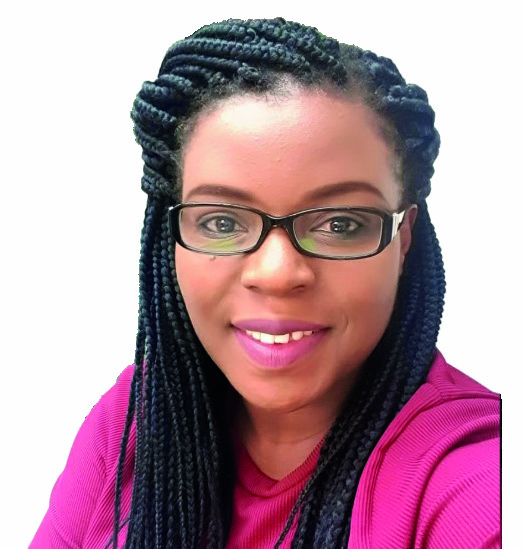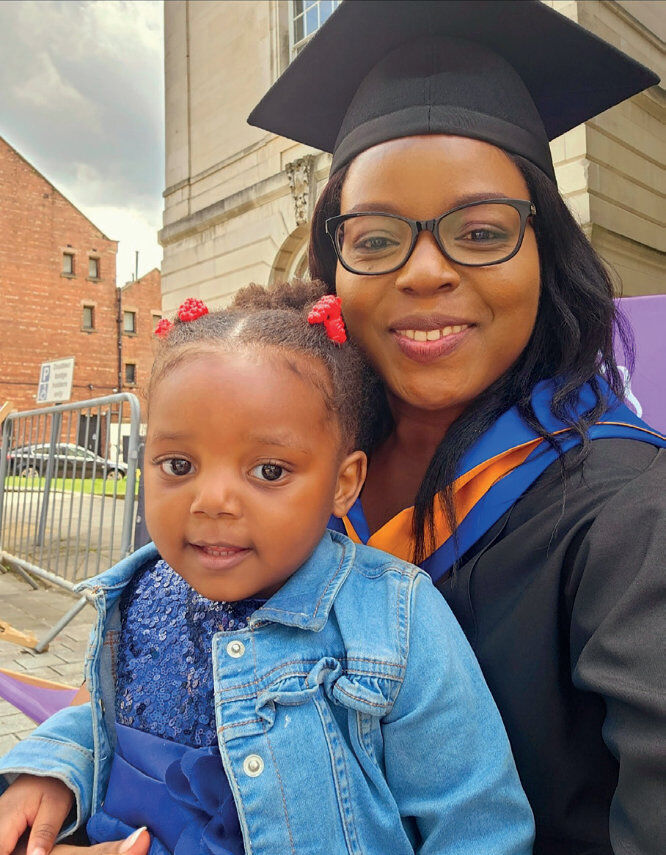 Fungai Bvumbwe reflects on being diagnosed with a brain tumour part-way through her occupational therapy degree and the road to graduation with a first-class honours degree, ‘against all the odds’.
Fungai Bvumbwe reflects on being diagnosed with a brain tumour part-way through her occupational therapy degree and the road to graduation with a first-class honours degree, ‘against all the odds’.
In my third year as an occupational therapy student, at the end of my final 10-week placement, I was diagnosed with a brain tumour.
They told me it was planum sphenoidale meningioma. This was after gradually losing vision and struggling with migraine headaches dating back to the start of my course in September 2020. The height of it all was complete loss of vision in my right eye during my final student placement. Initially I had taken a gap year after my first year, during the height of the COVID-19 pandemic when I was seven months pregnant, couldn’t go through the placement and had to isolate for pregnancy risk.
I successfully had a healthy baby girl, while I had minor complications of symphysis pubis dysfunction (SPD or girdle pain) and nerve problems affecting my legs.
However, I was still determined to complete the placement hours owing during my gap year at six months post-partum. Nothing was going to get in my way and I was determined to persevere and come back to my second year of studies.

As I look forward to the start of my occupational therapy journey in the profession, I am filled with so much joy, gratitude and resilience. And I am excited to continue learning as a newly-qualified occupational therapist, as I fully recover from brain surgery.”
When I felt like giving up in my toughest year of study, I had great support and mentorship from my tutor Dr Blaine Robin. I learnt so much from his work as a social scientist; understanding public health policies and exploring my identity and resilience as a Black student.
I took the opportunity to learn and reflect on my own path of overcoming the adversity of asylum seekers and refugees, through his work on occupational injustices – especially the concepts of occupational deprivation and marginalisation.
I was able to positively explore my own barriers to motherhood, parenting and identity, as I experienced a shift of cultural norms and traditions different to how I was raised in an African background.
Growing up in a single mother (widowed) household, I’ve learnt to ‘mentally mature’ faster than my age and build resilience and self-reliance to support my mother, together with my siblings, through a sewing business that provided financial source for school fees for my education up to my sixth-form study.
This instilled strong belief in myself around perseverance, despite the circumstances, and kept me going in my childhood.
I believe I carried this strength to my parenting as a young mother. However, moving to a different country and learning a new culture has been challenging, while facing social barriers in day-to-day life.
I have always looked after others. I am a ‘doer’ and I avoid relying on other people. Despite all the challenges of my brain tumour diagnosis, I was intentional about my self-reliance and also learnt to focus on getting the right help that I needed.
Above: Fungai Bvumbwe and her daughter Kayla-Jane
Growing up, I remember my mother would always tell us ‘rudo runotangira pauri’ – meaning ‘love begins with you’.
In the words of my mother, it meant selfimprovement begins with you before you go to the next person. It is only when you understand the importance of your existence to the next person, you are then able to divert your energy to help others.
It is this belief that I feel drives my passion in paediatric occupational therapy and early intervention with children’s challenges, working with families.
As a student, my second year was the toughest. My health continued to decline, with more vision loss and headaches during postpartum.
The doctors couldn’t identify what was wrong with me, as my symptoms were overlapping with postpartum. I developed health anxiety, experienced panic attacks and was put on special medication, as it was affecting me mentally.
But I pushed through, as giving up was not an option for me. I also had support and mentoring from Dr Angela Murphy in my postpartum period, when I felt confused about my occupational balance – trying to juggle my studies, personal life and work as a mother of three children.
In all this, in the mix of fighting my health challenges, I understood her support in allowing me to be able to remain calm, pause, reflect and evaluate my performance and believe in myself.

©Drazen Zigic via Getty Images
Sometimes it’s easy to overlook how well you are doing when faced with challenges, so it’s important to pause and reflect on your performance.
As I was pushing through my final placement, I remember waking up one day with a huge patch of vision loss in right eye, with the most extreme pressure type headache/migraine.
I recalled instantly that I’d had a very long day previously at placement, due to working on a student project. So, I convinced myself not to worry, that it was just tiredness, and that the vision would get better throughout the day as usual.
I was so used to carrying on with life – I’d been living with headaches and deteriorating vision for years – that it was normal for me. My coping mechanism during challenging times is always to carry on for as long as I feel an ounce of energy in me; I get up, dress up, show up, present myself as best as I can, because the moment I allow myself to feel emotions, it crashes me.
I remember having a conversation with myself on this particular day during reflective study time, as I was reading through student wellbeing resources given to me by my educator.
My occupational therapy mindset kicked in and I found myself assessing my abilities, thoughts about finding my occupational lens, and what kind of professional I wanted to be.
I had deep thoughts about checking in with myself, something I hardly do, as I as I am used to carrying on.
I began questioning myself: How can I be good for someone else, if I’m not good within myself ? Surely, I cannot keep pouring from an empty cup? I knew I was hanging by a thread, but why do I keep going? This prompted me to rush for an emergency eye check at the opticians.
My self-reflective thoughts on that day started my healing journey. Fast forward from there and everything happened so fast. I had an emergency MRI scan and it came back with a three centimetre brain tumour in about two weeks.
Thankfully I received my MRI scan results in early April, a week after completing my final student placement. To be honest, I had a brief moment of sadness in the doctor’s room when hearing the news. I felt numb, but something in me felt relieved that finally I knew what was wrong with me. I was not searching anymore, and I knew for sure it was the ‘healing moment’.
I accepted my situation and felt grateful for life itself and was more determined to complete my studies. I decided to keep my journey personal to myself and planned to make the best of the situation, to allow myself to focus and get the jobs done on my ‘to do list’. I was determined to complete my dissertation before undergoing surgery in June of that year.
I confided in our course leader Dr Heather Baglee, who gave me so much support and compassion in her guidance. And I also shared the news with the rest of the team of lecturers.
I had great support with my dissertation from the module leader Dr Daniel Cruz, as well as my supervisor Jo Atkinson. I felt understood and supported and I could have never completed my dissertation without them.
I took up their wise counsel and understood the meaning of the nature of the occupational therapy mindset, from their work on neurorehabilitation and occupational engagement.
Having a great team of experienced occupational therapists in my journey really helped me. This shaped my understanding of having a healthy balance of perseverance and determination, with a self-reflective analysis of who you are as a person and what kind of occupational therapist I desired to be as I completed my studies.
In the end, I graduated with a first-class honours degree. I can never thank the team of lecturers enough for keeping me going. Perseverance, with an intentional healthy balance, surely paid off in my journey.
As I look forward to the start of my occupational therapy journey in the profession, I am filled with so much joy, gratitude and resilience. And I am excited to continue learning as a newly-qualified occupational therapist, as I fully recover from brain surgery.
Words FUNGAI BVUMBWE , Occupational Therapist, Leeds Community Healthcare NHS Trust fungai.bvumbwe@nhs.net

